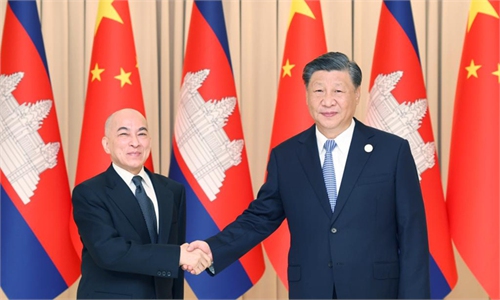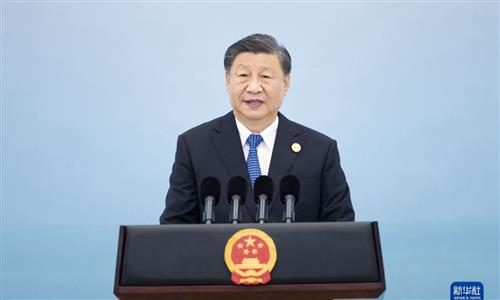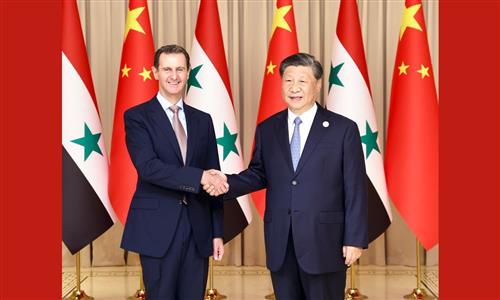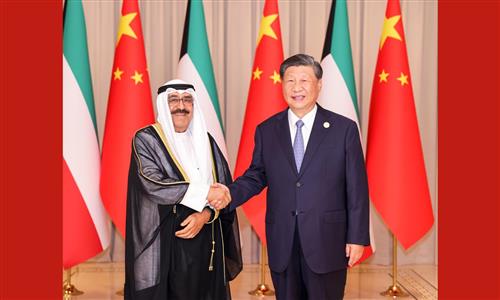Xi meets South Korean PM, calling on embodying the importance of China-South Korea ties in both policy and actions
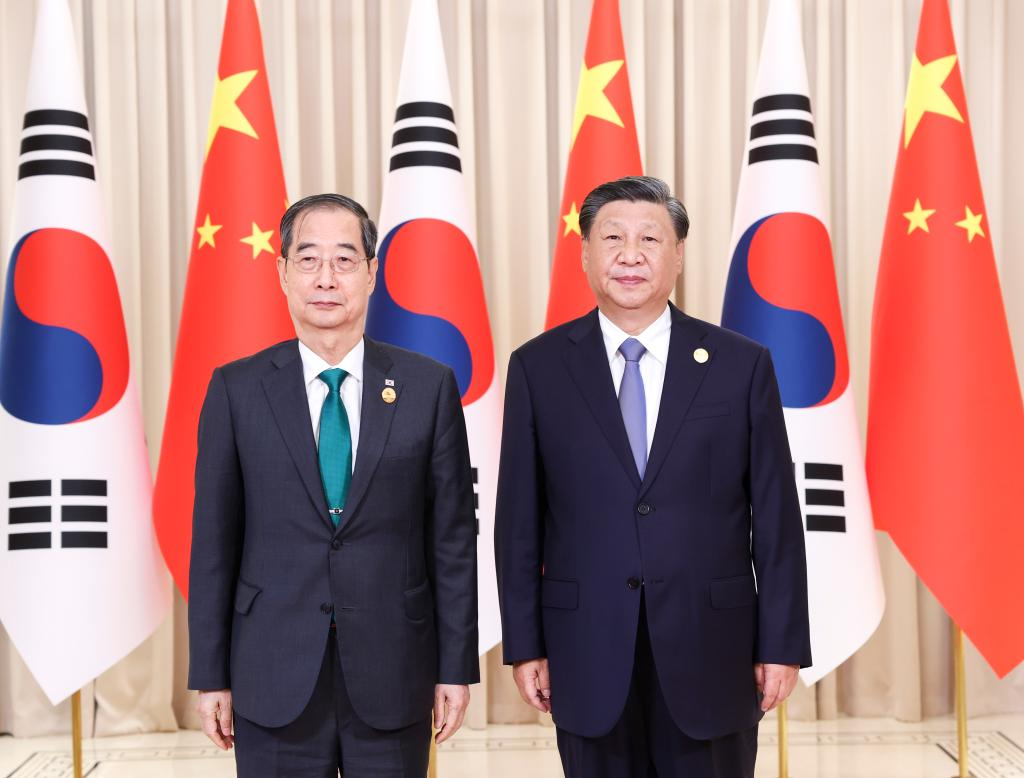
Chinese President Xi Jinping meets with Prime Minister Han Duck-soo of the Republic of Korea (ROK) in Hangzhou, capital city of east China's Zhejiang Province, Sep 23, 2023. Photo:Xinhua
Chinese President Xi Jinping met with South Korean Prime Minister Han Duck-soo on Saturday on the sidelines of the 19th Asian Games in Hangzhou, pointing out that China and South Korea are close neighbors that can't be separated, and the two countries are also inseparable cooperative partners. The steady and solid progress in China-South Korea relations serves the common interests of both nations and their people and is also beneficial for promoting regional peace and development.
Chinese experts noted that sending the country's prime minister to the Asian Games, which is among the highest-level visits across all the sports delegations, could be a sign. Seoul is showing Beijing that South Korea wishes to improve relations with China, especially when sports diplomacy has played such a vital role in history in breaking through the restraints of the Cold War and enhancing mutual understanding between the two Asian neighbors.
It's expected that South Korean Prime Minister Han's attending of the opening ceremony carries President Yoon Suk-yeol administration's urgent intention to ease tensions in bilateral ties, especially after the US had sent high ranking officials to carry out communications, showing a rational move in managing ties with China, they noted.
Since the establishment of diplomatic relations in 1992, China-South Korea relations have rapidly developed, bringing significant benefits to the people of both countries, Xi said, noting that China is willing to work with South Korea to continually update and develop the bilateral strategic cooperative partnership.
Since the establishment of diplomatic ties, friendly cooperation has always been the mainstream of China-South Korea relations, the Chinese president said. China maintains a policy of good-neighborliness and friendship toward South Korea and values South Korea's positive intention to advance China-South Korea cooperation.
Xi said that we hope that South Korea will meet us halfway, embodying the importance and development of China-South Korean relations in both policy and actions, with mutual respect and maintaining the overarching direction of friendly cooperation.
Given the close economic ties and deeply integrated supply and industrial chains between China and South Korea, both countries can deepen mutually beneficial cooperation and continue to benefit from each other. Both countries advocate for multilateralism and the global free-trade system. They can strengthen communication and coordination to push international order in a more just and reasonable direction, Xi said.
Such high-level meeting came after the meeting between Chinese Premier Li Qiang and South Korean President Yoon Suk-yeol on the sidelines of the leaders' meetings on East Asia cooperation held in Jakarta in early September. Analysts believed that such frequent high-level engagement will help move bilateral relations toward a positive direction.
"From the South Korean perspective, this is an opportunity to send a signal of hoping to actively improve relations with China. Meeting Chinese top leader on such an occasion implies South Korea's intention to further push forward the bilateral ties," Dong Xiangrong, a senior fellow at the National Institute of International Strategy at the Chinese Academy of Social Sciences, told the Global Times on Saturday.
Historically, especially before the establishment of diplomatic relations between China and South Korea, sports diplomacy played a critical role.
Events like the 1986 Asian Games and the 1988 Olympics in Seoul had a significant impact on breaking through the restraints of the Cold War and enhancing mutual understanding, thus paving the way for the establishment of diplomatic relations in 1992, Dong said.
"Both China and South Korea may find it necessary to actively cooperate in bilateral relations, especially considering the current critical period of China-South Korea relations," Dong said.
Over the past 31 years, particularly in 2022 when bilateral trade exceeded $360 billion, South Korea has become China's second-largest trading partner country, overtaking Japan while China has been the South Korea's largest trading partner country for many years. This has greatly benefited the people and economies of both nations.
Beyond economic and trade ties, there has been an increase in socio-cultural exchanges and political trust between the two countries. Both nations should cherish the development achievements they have made so far, avoiding any potential downturns in the relationship, the expert noted.
During the meeting with Xi, Han said that in the face of numerous challenges at the international level, maintaining high-level interactions between South Korea and China is beneficial for advancing bilateral relations and cooperating to address challenges.
South Korea is willing to work with China to develop a healthy and mature China-South Korea relationship. It is hoped that both sides will strengthen economic cooperation, people-to-people exchanges, and cultural interactions, adhere to multilateralism and free trade, and jointly promote the recovery and growth of the world economy.
Some media reported that Han would use the Hangzhou journey as an opportunity to revive the three-way summit that also includes Japan.
Lü Chao, an expert on the Korean Peninsula issue at the Liaoning Academy of Social Sciences, said that South Korean President Yoon Suk-yeol is facing with mounting domestic pressures as the government went too far in the extreme pro-US path, became an anti-China front even in the US geopolitical manipulation and accordingly reduced the China-South Korea ties to historical lows with repeated wrongful wordings over the Taiwan question.
The political tensions have become a significant barrier to revive the three-way cooperation mechanism, and Seoul should be responsible for it, Lü told the Global Times on Saturday.
Han is entrusted by President Yoon and the government of South Korea to make efforts to repair ties with China. As the rotating presidency of trilateral cooperation mechanism, if South Korea could revive the three-way summit, it is in line with the common aspiration of three countries and would be a great help to correct Yoon's wrong diplomatic path, the expert said.
Chinese President Xi made remarks at the welcoming banquet, which Han also attended, on Saturday noon that Asian countries should adhere to good neighborliness and mutual benefit, and reject the cold war mentality and camp-based confrontation.
Such words would send olive branches to South Korean political elites who are making positive efforts for the regional peace, solidarity and inclusiveness. The door of developing China-South Korea relations on the right track is always open, experts said.
While China and South Korea are important neighbors to each other, China is more important to South Korea. Recently, South Korea's diplomatic focus and resources devoted to China have been far below expectations, Dong noted. "Under such circumstances, both sides should accord each other the importance that reflects their significance and further promote the development of bilateral relations."


